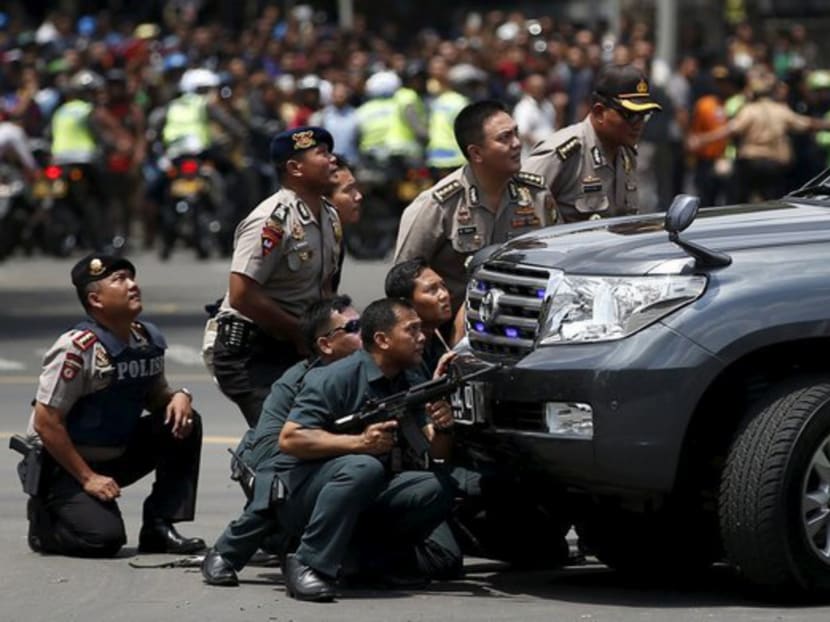Terror threat a top concern as Parliament sits
SINGAPORE — The Republic’s security in the face of a hardening terror threat was the dominant theme on the first day of debate on the President’s Address yesterday, with Members of Parliament also concerned about economic growth and the need to equip Singaporeans to deal with uncertainties ahead.

Police officers react near the site of a blast in Jakarta, Indonesia, on Jan 14, 2016. Photo: Reuters
SINGAPORE — The Republic’s security in the face of a hardening terror threat was the dominant theme on the first day of debate on the President’s Address yesterday, with Members of Parliament also concerned about economic growth and the need to equip Singaporeans to deal with uncertainties ahead.
The first parliamentary sitting this term of Government saw 17 MPs rising to speak, with eight of them making their maiden speeches in the House.
With Singapore embarking on its 50th year of independence, parliamentarians also spoke of the need to strengthen national identity, enhance the social compact and uphold good politics to ensure the country continues to prosper. From education and governance to the political system, there were also calls to rethink the approaches that have brought success to Singapore so far but need to be adapted in these new times.
On the back of the recent high-profile terror attacks in Paris, Beirut and Jakarta, and last week’s announcement of 27 Bangladeshis arrested here for plotting to carry out attacks in their home country, the threat of terrorism has been topmost on the minds of Singapore leaders of late, with Home Affairs Minister K Shanmugam and Prime Minister Lee Hsien Loong stressing the need for Singaporeans to stay vigilant. National security also weighed heavily on the minds of nearly half of the speakers yesterday.
Every member of society must help fight terrorism, said Parliamentary Secretaries Amrin Amin (Home Affairs) and Low Yen Ling (Education and Trade and Industry), who devoted sizeable portions of their speeches to the topic.
Mr Amrin, one of the new faces who spoke, said the Government is working hard to tighten checks at borders and is increasing closed-circuit television surveillance in public areas. Security agencies will step up their readiness to prevent and deal with an attack, and will work with building owners to beef up protection of hard and soft targets, he said.
But should a terrorist attack happen, Singaporeans must not allow it to sow discord in the community, he said. “Brick and mortar can be repaired and rebuilt easily. Fractures in our community cannot be fixed so readily.”
Calling counter-terrorism “a battle beyond border controls, guns or law”, Ms Low called for social inclusion and harmony to counter any “lies” used by radicals to draw the disenfranchised.
“In an economic downturn or difficult times, it is even easier for any terrorist influence to play the card of race and religion to divide us. Potential fault lines like a wrong understanding of Islam, racial stereotyping, or a weak national identity can threaten us from within,” she said.
First-term MP Tan Wu Meng (Jurong) said Singapore should imagine the “perfect storm” to be ready to survive anything the future mightbring. Possible elements that could contribute to this tumult he cited included the effects of a long-running global economic downturn, divisions among different religions or social classes, and divisive politics. A major crisis such as a terrorist attack or a pandemic could also happen, he added. In preparation for such a scenario, Singaporeans must keep building a sense of fellowship with one another, said Dr Tan.
Economic prospects and governance formed the other major themes of the day, with MPs including Mr Chong Kee Hiong (Bishan-Toa Payoh), Ms Sylvia Lim (Aljunied) and Acting Minister for Education (Higher Education and Skills) Ong Ye Kung diving in.
Mr Chong said continued economic growth and wealth is needed to generate sufficient revenue for defence, infrastructure, social schemes and saving for future generations. Noting shorter business cycles and the relentless pace of change, he drew attention to groups such as mid- to senior managers in their 30s and 40s who may be retrenched and require help to transit to new jobs.
Mr Ong said Singapore should look at China as a tremendous business and consumer market and learn to tap it, rather than fixate on pessismism over its slowing growth. Singapore must also seek its fortunes in the region, and be able to bridge cultures and have depth in skills and know-how, he said.
But Singapore society should evolve in the way decisions are made, from strict adherence to rules to more exercise of judgment and discretion — even as it continues to stand firm against corruption, said Mr Ong. This is because the world is now “too complex to be reduced to rules”, and qualities of people cannot be expressed in one metric, he said. “Abiding by rules is part of standard operating procedure, but so too, must be exercise of judgment ... A well-calibrated, greater exercise of judgment must permeate throughout our system.”
What will also evolve with time is national identity, and it is important that Singapore continues building common spaces and preserving buildings, old trees and historical artefacts, said Mr Ong. “And I think our HDB flats also deserve UNESCO recognition. Not that we applied, but this is truly our heritage.”
On the issue of collaborative governance, Workers’ Party chairman Ms Lim faced opposition from the ruling party’s Dr Tan and Dr Fatimah Lateef (Marine Parade).
Ms Lim said it was not enough for alternative views to be “articulated” and “taken into consideration”; for true collaboration between the public, private and people sectors, “no partner should be dominant”.
“The Government needs to let go and devolve more power first, so that there is real and meaningful collaborative partnership among equals,” said Ms Lim, who also called for changes in how schools assess students. Disagreeing, Dr Fatimah said working jointly need not mean having an equal partnership.
The debate continues today.






